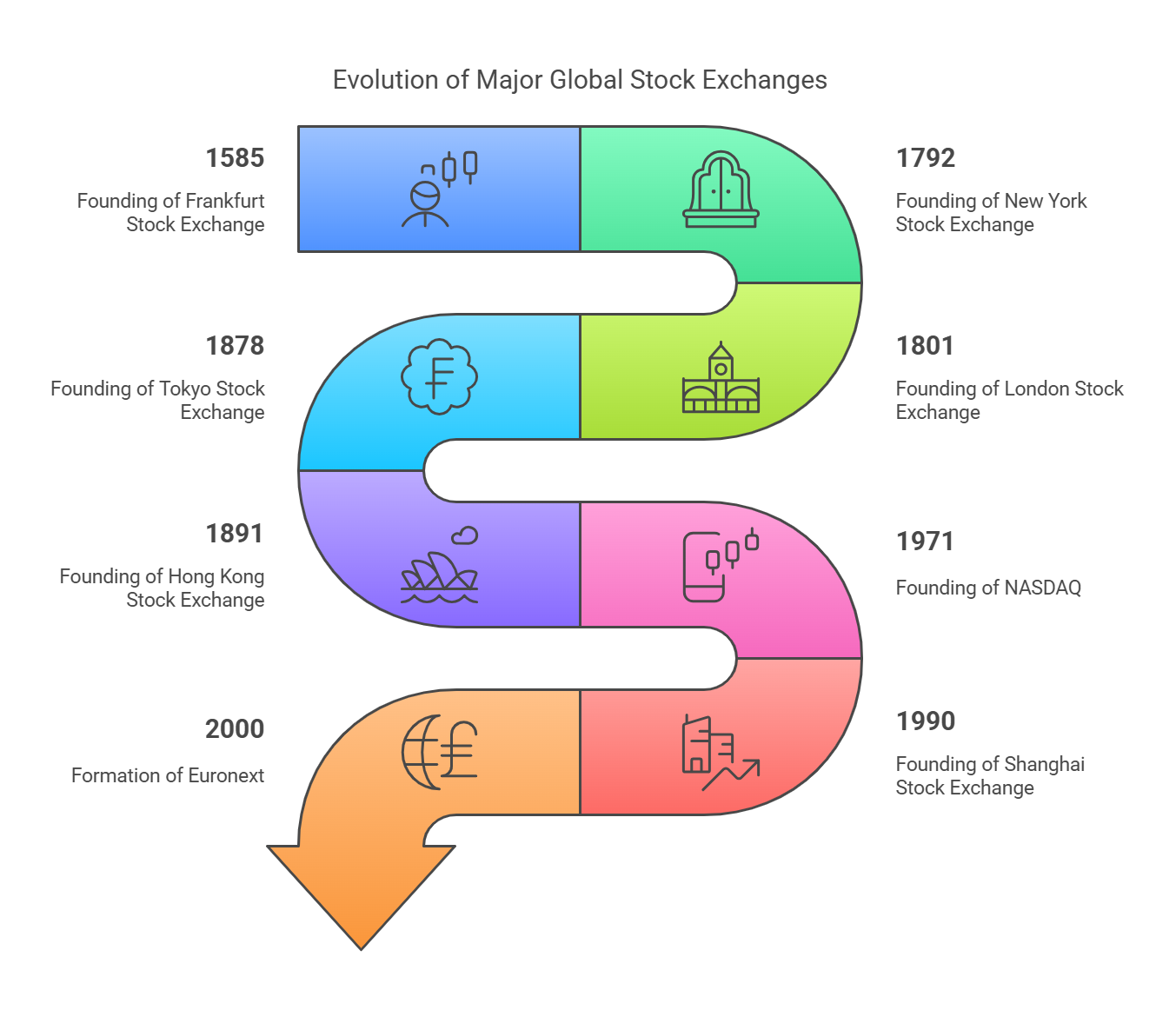International Stock Exchanges
1. Introduction to International Stock Exchanges
International stock exchanges are regulated marketplaces where securities, such as stocks, bonds, and derivatives, are traded. These exchanges are vital for facilitating global capital flows, enabling companies to raise capital internationally, and providing investors with opportunities to diversify their portfolios across different markets.
2. Major International Stock Exchanges
A. New York Stock Exchange (NYSE) – USA
- Founded: 1792
- Location: Wall Street, New York City
- Benchmark Index: Dow Jones Industrial Average (DJIA), S&P 500
-
Key Features:
- Largest stock exchange in the world by market capitalization.
- Lists major companies from various sectors, including iconic names like Apple, Microsoft, and Tesla.
- Operates through a combination of auction-based and electronic trading systems, balancing tradition with modern technology.
B. NASDAQ – USA
- Founded: 1971
- Benchmark Index: NASDAQ Composite, NASDAQ-100
-
Key Features:
- The world's first electronic stock exchange, pioneering the use of technology in securities trading.
- Primarily known for listing technology and internet companies, including giants like Google (Alphabet), Amazon, and Meta (Facebook).
- Operates a dealer-based, fully automated trading system, emphasizing speed and efficiency.
C. London Stock Exchange (LSE) – UK
- Founded: 1801
- Benchmark Index: FTSE 100 (Financial Times Stock Exchange)
-
Key Features:
- One of the oldest stock exchanges in the world, with a long history of facilitating global trade and investment.
- Serves as a key financial hub for European and international companies, attracting listings from diverse sectors and regions.
- Facilitates trading in a broad range of securities, including stocks, bonds, and derivatives.
D. Tokyo Stock Exchange (TSE) – Japan
- Founded: 1878
- Benchmark Index: Nikkei 225, TOPIX
-
Key Features:
- The largest stock exchange in Asia, reflecting the economic power of Japan.
- Lists major Japanese firms, including global brands like Toyota, Sony, and SoftBank.
- Trades primarily in yen-denominated stocks and Exchange Traded Funds (ETFs).
E. Shanghai Stock Exchange (SSE) – China
- Founded: 1990
- Benchmark Index: SSE Composite Index
-
Key Features:
- The largest stock exchange in mainland China, reflecting the country's rapid economic growth.
- Operates a dual-class share system, with A-shares (for domestic investors) and B-shares (for foreign investors), although access to A-shares has gradually opened up to foreign investors.
- Trading activities are subject to strict government regulations, reflecting the Chinese government's control over its financial system.
F. Hong Kong Stock Exchange (HKEX) – Hong Kong
- Founded: 1891
- Benchmark Index: Hang Seng Index
-
Key Features:
- A major global financial hub, serving as a gateway for international investors to access the Chinese market and vice versa.
- Facilitates capital raising for Chinese companies looking to attract global investors while adhering to international standards of corporate governance and disclosure.
- Hosts dual listings for both global and Chinese firms, enhancing market depth and investor choice.
G. Euronext – Europe
- Founded: 2000 (through the merger of the Paris, Amsterdam, and Brussels stock exchanges)
- Benchmark Index: Euronext 100
-
Key Features:
- The largest stock exchange in Europe, representing a consolidation of major European markets.
- Operates across multiple European countries, including France, Netherlands, Belgium, Portugal, and others.
- Offers trading in a diverse range of financial instruments, including equities, bonds, and derivatives.
H. Frankfurt Stock Exchange (FSE) – Germany
- Founded: 1585
- Benchmark Index: DAX 40
-
Key Features:
- The largest stock exchange in Germany and one of the most important in Europe, reflecting the strength of the German economy.
- Lists major industrial and automotive companies, including global leaders like BMW, Siemens, and Volkswagen.
- Operates a fully electronic trading system (Xetra), providing efficient and transparent trading.
3. Role of International Stock Exchanges in the Global Economy
International stock exchanges play a critical role in the global economy by:
- Capital Raising for Companies: Enabling companies to access international investors and raise capital on a global scale, supporting growth and expansion.
- Global Portfolio Diversification: Providing investors with opportunities to diversify their portfolios across different markets, reducing risk and enhancing returns.
- Economic Indicators: Serving as important indicators of the economic health and investment climate of a country or region.
- Cross-Border Investment Opportunities: Facilitating mergers, acquisitions, and other forms of cross-border investment, promoting global economic integration.
Conclusion
International stock exchanges are essential for global finance, facilitating cross-border investments, capital formation, and market liquidity. Exchanges like NYSE, NASDAQ, LSE, and TSE significantly influence global stock movements and investor decisions.


No Comments